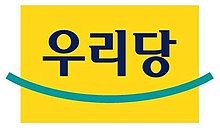Yeollin-uri party
|
열린 우리당 Yeollin-uri-dang Our Open Party |
|
|---|---|

|
|
| founding | November 11, 2003 |
| resolution | August 20, 2007 |
| Headquarters |
Yeongdeungpo-gu ( 영등포구 ), Seoul ( 서울시 ) |
| Alignment | Left-wing liberal |
| Colours) | yellow |
| Korean spelling | |
|---|---|
| Korean alphabet : | 열린 우리당 |
| Revised Romanization : | Yeollin-uri-dang |
| McCune-Reischauer : | Yŏllin-uri-tang |
The Yeollin-uri party ( Korean 열린 우리당 Yeollin-uri-dang , German ' Our Open Party ' ) was a left-wing liberal party in South Korea that existed from 2003 to 2008. The party was abbreviated in common parlance as Uri party ( Uri-dang ' We party ' ).
history
The party was founded in 2003 when the loyalists of President Roh Moo-hyun ( 노무현 ) in the Sae-cheonnyeon-minju-dang ( 새천년 민주당 'Democratic New Millennium Party' ) decided to part with the party members who had little support for the newly formed government showed. A total of 42 of the 103 MPs of the Sae-cheonnyeon-minju party and others from the conservative Hannara-dang (Great National Party) (GNP) switched to the newly founded party. On August 18, 2007, the party dissolved and formed the United New Democratic Party (UNDP) together with other liberal groups .
After the clear defeat of its candidate in the presidential election in December 2007, the UNDP decided in February 2008 to merge with the party renamed the Minju Party ( 민주당 Minju-dang , German 'Democratic Party' ) to form the Minju Party ( 민주당 Minju -dang , German 'Democratic Party' ). Four and a half years after the split between the Uri party and the Sae-cheonnyeon-minju party, the liberal parties had reunited.
Founded as the “New Party for Participating Citizens”, the organization changed its name to Yeollin-uri-dang (Open We Party) on October 22, 2003. Her new name should reflect her goals, which are understood as progressive, such as national reunification , readiness for citizen participation and the urge for reforms. Politically, the Uri Party a. a. advocate an expansion of the social systems to include low-income groups. After the Asian crisis of 1997/98, moderate economic growth was aimed for and with respect to North Korea an approximation is still being pursued within the framework of the “ sunshine policy ”. The party is also trying to break the country's close strategic alliance with the United States and Japan.
The party attracted international attention when its members physically blocked the speaker's desk in the National Assembly to prevent President Roh from being impeached on March 12, 2004. Even if this protest was unsuccessful, the impeachment was later overturned by the South Korean Constitutional Court. In the last parliamentary elections in 2004 , the Uri party won 152 of the total of 299 seats and thus claimed its own majority.
An investigation, initiated by President Roh on August 15, 2004, the 56th anniversary of independence from Japan , was part of a national campaign to further educate people about the activities of those involved with Japan on pro-Japanese political issues worked together. On August 19, 2004, the party got into an affair because the National Commission of Inquiry revealed that the father of then Chairman Shin Gi-nam ( 신기남 ) had worked for the Japanese military police during the colonial era . Ironically, the campaign was endorsed by Shin and the Uri Party.
The party's popularity deteriorated further due to internal conflicts and scandals surrounding the president, who admitted that he felt “incompetent” and “not fit” for top government office. Since the parliamentary elections in 2004, the Uri party has not been able to win a single seat in the local elections. In August 2005 the party finally had to give up a majority in parliament. Significant defeats followed in 2006 as well, which in May of that year, after the GNP won 13 of the 16 provinces, led to the resignation of Chairman Chung Dong-young ( 정동영 ), who apologized for the party's “self-righteous attitude and inappropriateness”. The party even lost in Matropolitan City Daejeon ( 대전 광역시 ), a city long considered a Uri stronghold.
See also
Individual evidence
- ^ Uri Disbands to Merge With Liberal Party . In: The Korea Times . August 19, 2007, accessed May 11, 2016 .
- ^ Two Liberal Parties Agree to Merge . In: The Korea Times . February 11, 2008, accessed May 11, 2016 .
- ^ South Korea's raw rejects cabinet resignation . In: China Daily . October 11, 2003, accessed May 11, 2016 .